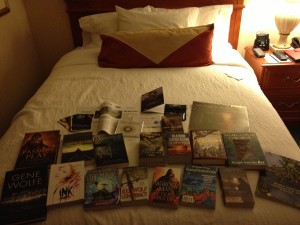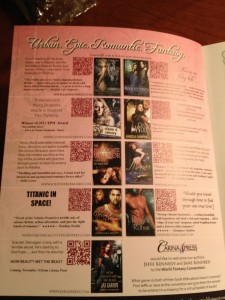 I’m over at Word-Whores this morning, talking a bit about World Fantasy Con and giving my bullet points on how you know a series needs to end.
I’m over at Word-Whores this morning, talking a bit about World Fantasy Con and giving my bullet points on how you know a series needs to end.
Category: Blog
World Fantasy Con 2012 – Day 0
I’m just popping in for a quick Thursday post to update on World Fantasy Con 2012.
I’m calling yesterday Day Zero because I mainly traveled, got here late and ate dinner. BUT, I did hit the early registration at 9:30 pm and got the Enormous Tote Bag of books. Yowsa!
And the Carina Press spec fic authors’ page in the program looks fab indeed. That’s the inside front cover – very nice placement.
Events start at 2pm today, so hopefully there will be more missives!
One Tool for NaNoWriMo
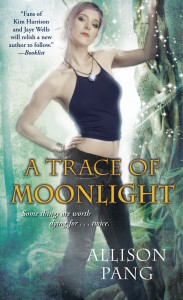 A big shout out today to long-time writer buddy Allison Pang for the release today of the third book in her Abby Sinclair series, A Trace of Moonlight. Makes me all nostalgic because it seems like just a short time ago that I was reading the first chapters of what became the first book, A Brush of Darkness, and giving her feedback.
A big shout out today to long-time writer buddy Allison Pang for the release today of the third book in her Abby Sinclair series, A Trace of Moonlight. Makes me all nostalgic because it seems like just a short time ago that I was reading the first chapters of what became the first book, A Brush of Darkness, and giving her feedback.
Also, Carolyn Crane’s Mr. Real is out today! You read all about her cover trials before here.
I know a lot of you are heading into NaNoWriMo, the national novel-writing month, where people attempt to write 50,000 words in November. I don’t really like to do NaNoWriMo, because I find I’m happier if I can create and sustain a more regular writing schedule than a big one-month push. But a lot of people love it – especially the camaraderie and feeling like part of a team.
Me? I love my spreadsheets. And, because I’m sometimes asked, I decided to share a whittled-down version of my Progress Count spreadsheet. (I hope the sharing works – I *think* I uploaded it correctly.) Here it is:
Jeffe Kennedy Progress Count template
I say this is whittled down because my actual workbook has 15 tabs, with various works in progress. So, for template’s sake, I included just Rogue’s Possession, which I just finished drafting, and Ruby, which is underway.
On the first tab, the Overall page, is where I track all the words I do for each week. I recently decided to start tracking by month and year, too, just for grins. However, I just added that last week, so the October count is likely a little short. But it’s a close estimate. The Overall tab also adds in my blog post writing for each day, which I think totally counts. My minimum effort for any week is 7,000 words.
Ruby is the next tab because that’s the one actively underway. I pretty much only work on one thing at a time – unless a deadline interferes. For example, if my editor sends me edits and says “can I have these back by Tuesday?” or if Agent Pam says “they’d like to see a sample chapter.” And yes, in those cases, I absolutely move that book’s tab into the space of honor.
That’s just how I roll.
Ruby’s tab is still set for yesterday, because I haven’t dug in for today’s wordcount.Rogue’s Possession is empty because it’s done for now.
But feel free to play with this. I have lots of formulas and conditional formatting, because I love to see things turn green. Ask me questions here, if you like, and I’ll try to explain my reasoning.
Happy Word Counts!
How to Keep Zombies Fresh
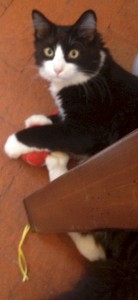 I’m over at Word Whores today talking about how to write in new ways about old things – like rotting reanimated corpses.
I’m over at Word Whores today talking about how to write in new ways about old things – like rotting reanimated corpses.
And if you need a palate-cleanser after all that talk of death and would like to taste the opposite side of the coin, I’m participating in a fun little sale of erotic books. Sister Word Whore Carolyn Crane is also playing. You can check it out here.
Directing Creativity – Managing an Infinite Resource in Finite Ways
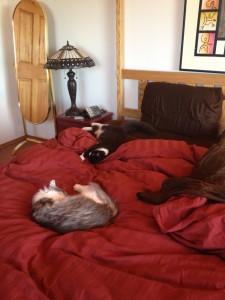 So, the big news is, I officially finished the draft of RP2, now officially dubbed “Rogue’s Possession.”
So, the big news is, I officially finished the draft of RP2, now officially dubbed “Rogue’s Possession.”
Exciting, yes – but the above pic truly encapsulates how we celebrate around here. Ahhh….
It’s so interesting to me how creativity works. We often talk about it like it’s a well, where the water flows at a certain rate, can be drawn down, needs time to replenish, and – horror of horrors – could maybe run dry. But I wonder if this is really an accurate metaphor? After all, creativity is a kind of energy, but it’s not subject to the physical laws of the universe. It almost belongs to the spiritual realm. My physical body might tire – the brain that translates the story, the hands that type it – but it seems to me the creativity itself should be endless.
Yet, it never feels that way.
Here it is, October 26, and I haven’t put up my Halloween decorations. I *love* Halloween. I have two great big bins of decorations sitting in the garage. I’d thought maybe I’d put them up last weekend, but I spent my time writing 10,000 words on Rogue’s Possession.
I know that’s not my usual thing, but I was experimenting. David was out of town for the weekend and I really wanted to finish Possession so I can get started on Ruby (book 3 in Facets of Passion) which is due to fabulous editor Deb at the end of November. So, I tried writing five 60-minute blocks each day. In between, I walked the dog, cooked meals, did dishes, that sort of thing.
Did not put up decorations.
It just felt like too much. Though it would have taken very little time, really.
And I did it! I wrote a little over 5K each day, did not feel exhausted and it let me finish the book early. The ending can be like that for me – I just have to keep going with it, because if I stop, I can lose the threads. Somehow, though, that extra bit of tangential creativity, putting up some decorations, seemed absolutely impossible.
I’ve done this at other times in my life, when things going on just absorbed so much of my personal energy that other stuff just had to be dropped, totally and completely. Shut the door and sever the cord. I used to quilt and loved it, but finally faced that I had to stop and divert that energy into writing. That choice made a huge difference in my writing productivity.
Now that the book is finished, I feel that energy bubbling within. Which is great news for Ruby!
Maybe I’ll get those decorations up this weekend…
Also, if you’re online this weekend, I’ll be participating in Coyote Con – an online free writing conference. I’ll be on a panel for Fantasy Romance, 6-7pm Eastern Time tonight. Tomorrow, 2:30-3:30pm ET, I’ll be on a panel with some fab friends “THE GOOD, THE BAD, THE GIRLY & THE MANLY” and another panel tomorrow night (Saturday 10/27), 9:30-10:30pm ET, on erotica and erotic romance.
Next weekend, I’ll be in Toronto for World Fantasy Con – provided Frankenstorm doesn’t raze the city. And, while I’m in Toronto, I’ll be signing cover flats at the Ellora’s Cave booth at the Everything to Do with Sex Show on Saturday evening, November 3, 7-9 pm.
Picking Your Dream Agent – as Likely as Finding Your Dream Man
You know you’ve heard writers use the term. Hell, I’ve heard agents use the term. There’s this persistent idea in the publishing world that an up and coming writer should make a list of the qualities they want in an agent and, through dint of much research, develops a tiered list of desirable agents, presumably with the Dream Agent in the number one position.
Presumably this research includes the agents’ track records of sales, clients, social interactions, reliability, integrity, agency agreements and just general lovability.
It’s not that writers shouldn’t do this research – they absolutely should – but much of this is romantic silliness and not business.
Seriously.
You know what it reminds me of? Those girlfriends I had in middle school who made lists of their Dream Man. He would be rich, kind, good sense of humor, nice hands, works out, reads, loves cats and likes to walk on the beach Sounds great, right? And how many of us ended up with this person, this unicorn of a lover?
Arguably no one at all, because this isn’t about reality. This is the dream. The fantasy.
Dreams and fantasies are great – they keep us vitalized with possibility. But at some point you have to face reality.
We learn this when we start truly dating instead of making hopeful lists. Over time, over dinners and coffees and cocktails and gritty morning-afters, we discover that these dream lovers are all just people. Some make more money than others. Kindness is relative and not necessarily the best quality without a leavening of self-preservation. Maybe he reads, but he likes nonfiction and you don’t. The Dream Man list goes out the window.
Instead, you develop the Dealbreaker List.
I truly believe in this. Part of knowing ourselves is learning what we can adjust to and what’s a Dealbreaker. For me? Jealousy is a dealbreaker. Don’t love cats? Major problem. Won’t or can’t rationally discuss problems? Dealbreaker.
Because finding a life partner is really a quest to find a person who fits with you, who enables you to do in life what’s most important to you, you start discovering what qualities you need for that – and which qualitieis you simply cannot live with.
And this, my friends, is how it should be with finding an agent, too.
A gal contacted me the other day. My agent had offered her representation and she was asking after my experience, which is truly just fine. I’m happy to do that. However, she included a laundry list of questions for me to fill out. I don’t know about you guys, but I look at an email with a long list of things for me to answer and I want to hit delete. But I read through them, because I do like to be helpful, and it struck me that this was the Dream Agent list.
My first response (okay, second, after wanting to hit delete) was to wonder why she’d queried my agent at all if she had these concerns. Then I wondered if she was really ready to have an agent at all. She seemed to be asking if everything would be perfect and she’d never ever regret this decision. She wanted her Happily Ever After with the Dream.
Thing is, and I can’t say this enough, signing with an agent is agreeing to a business deal. They hope to reap rewards from selling your work and you hope they’ll sell you bigger and better than you can do on your own. It’s as simple as that.
If I compared my agent to a Dream Agent list, she would not ring every bell. That was okay with me because she brought qualities to the table I wouldn’t have known to put on a list. More important – there were no dealbreakers. Besides, we’re not getting married. We can break up if it doesn’t work out. We’re working together, developing our rhythm, seeing what we can do between the two of us.
Just like any relationship.
Oh! And for the record – I told the gal asking that I’m very happy with Agent Pam.
But I didn’t fill out the list.
How to Find the Scary in a Story
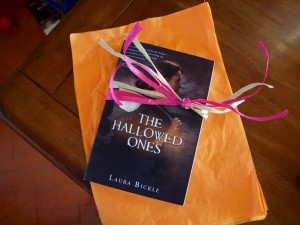 I’m over at Word Whores today, where I punted and gave the ball to the lovely and talented Laura Bickle, who tells us how to make a story scary. AND I’m giving away a copy of her excellent – and very scary! – book, THE HALLOWED ONES.
I’m over at Word Whores today, where I punted and gave the ball to the lovely and talented Laura Bickle, who tells us how to make a story scary. AND I’m giving away a copy of her excellent – and very scary! – book, THE HALLOWED ONES.
The Luxury of Small Aggravations
 This is an eight-foot tall glass Christmas tree made by Dale Chihuly for the Clintons when they were in the White House. It’s on display in the Clinton Presidential Library in Little Rock, Arkansas. I was there for a day job conference and the final night’s banquet was at the library – a place I would never have thought to go on my own, for any president. Now I’m considering seeing as many as I can, when I’m in the right area. Just fascinating. I confess the replica of the Oval Office gave me a surprising emotional tingle. They replicated exactly what Clinton had on his desk and now I’m rethinking my tchotchkes.
This is an eight-foot tall glass Christmas tree made by Dale Chihuly for the Clintons when they were in the White House. It’s on display in the Clinton Presidential Library in Little Rock, Arkansas. I was there for a day job conference and the final night’s banquet was at the library – a place I would never have thought to go on my own, for any president. Now I’m considering seeing as many as I can, when I’m in the right area. Just fascinating. I confess the replica of the Oval Office gave me a surprising emotional tingle. They replicated exactly what Clinton had on his desk and now I’m rethinking my tchotchkes.
Of course, Jackson just jumped up on my desk, nabbed one, and took off with it, so it could be a self-resolving situation. If I had a bust of Nelson Mandela, he wouldn’t be pulling that shit.
I flew back yesterday, landing in Albuquerque in the late afternoon. Regular readers know I’m often cranky coming back from work trips, because they throw my writing schedule all to hell and gone. It’s just how it goes. As I drove up the interstate, I immediately hit a major traffic slow-down and groaned, thinking I’d hit rush hour and it was going to be a bad one. I ran the calculations in my head, if I should take an alternate route that’s normally longer, but would save me going through the whole city at that speed.
If you’ve never driven in Albuquerque, you should know that the traffic can be terrifying. There’s no good reason for it, but people drive *really* fast and change lanes rapidly, weaving in an out of traffic. This is in addition to the decrepit vehicles from Mexico, with Chihuahua or Sonora license plates, pottering along easily 30 mph below the speed limit. Even people accustomed to driving in the free-for-all of Boston rush hour can be taken aback.
You have to look sharp.
After a couple of miles of stop and go, a truck pulled into traffic with the elevated lighted signs that point traffic to change lanes. It was an accident then. Sure, enough, as we all merged over to the rightmost lanes, I passed the wreck. Three or four vehicles were jumbled up in the left lane – one pickup truck spun around so it faced traffic. No cops or EMTs had arrived yet, but people were gathered around the cars in little clusters. It looked – miraculously – like mostly the vehicles had gotten banged up, not the people. One man, though, older, probably in his 70s, leaned against the concrete barrier by himself. He looked stunned and bewildered in a way that grabbed at me. I wanted to pull over and tell him it was okay, that at least he wasn’t hurt.
His face stuck with me for the rest of the drive and I wondered about him – if he’d had someone to call. If his wife had been angry or understanding or if she was maybe so far gone into dementia that she’d never understand what happened to him that afternoon.
It’s an easy thing to take for granted – all those days that aren’t ruined by sudden disasters. Instead we focus on the irritating minutiae. The minor aggravations of all the little things that don’t go exactly the way you want them to.
What a luxury that is.
Superstition as a Survival Skill
 I’m over at Word Whores today talking about using superstitious characters.
I’m over at Word Whores today talking about using superstitious characters.
How Not to Be Distracted by Distractions
 I got my trophy in the mail the other day for Sapphire’s win in the OKRWA International Digital Awards. It’s very pretty. I may or may not sit and gaze at it from time to time. Especially during day job conference calls.
I got my trophy in the mail the other day for Sapphire’s win in the OKRWA International Digital Awards. It’s very pretty. I may or may not sit and gaze at it from time to time. Especially during day job conference calls.
My big boss, head of our 60-some person team, Chi Ho really hates it if we’re not paying attention to conference calls. For people in the office, he makes them come to the conference room for big meetings, instead of phoning in from their desks, as many would prefer. Chi Ho says that there’s no such thing as multitasking, that if you think you are, you’re really not paying attention to any of the several things you’re doing. I think he does have a point.
Yesterday I was talking on the phone with a gal junior to me who’s doing a whole bunch of work on my projects. She’s very sharp, organized and I trust her with a lot. We were doing long-term strategizing about finishing out projects for the rest of the year. As we were talking, an email from Chi Ho popped up on my screen and I scanned it – then realized this gal had asked me a question. I rewound the tape in my head, but no, I didn’t have it. I had to confess that I’d been reading Chi Ho’s email and had stopped listening and what was her question again? She started laughing and said “caught you multitasking!”
I’ve been reading The Creative Habit by Twyla Tharp, which was a gift from the lovely Laura Bickle. It’s a very interesting take on creative and leading an artistic life, because Twyla comes at it from such a different perspective. As a dancer and choreographer, her creative process is in some ways the polar opposite of a writer’s. She is physical where we are sedentary, working with large groups compared to our solitary dreaming. But the differences point up the similarities in how we create and nourish new ideas. I’ve been highlighting a lot and this one struck me:
The irony of multitasking is that it’s exhausting; when you’re doing two or three things simultaneously, you use more energy than the sum of energy required to do each task independently. You’re also cheating yourself because you’re not doing anything excellently. You’re compromising your virtuosity. In the words of T.S. Eliot, you’re “distracted from distractions by distractions.”
It’s a challenge to cut out multitasking because we all get a frisson of satisfaction from being able to keep several balls in the air at once. But one week without multitasking is worth it; the increased focus and awareness are their rewards.
That’s Twyla’s idea – that cutting out all distractions for a week improves creativity. She’s pretty draconian about it, saying that when she’s working up a new dance, she cuts out all input for a week before – email, TV, music, newspapers, everything. This is where I see a big difference in being a writer. I suppose there was a time when a writer prepared to Write The Next Book and would do this creative preparation. However, these days, I think most of us are writing pretty much all the time. I know I have to. I finish one project and move on to the next. So, while seductive*, it’s not practical for me to create this well of silence around my creative process.
*And it’s totally seductive to me. I have this idea that I would love to be a cloistered nun and take a vow of silence. Except that I’m not religious and I really like sex and other hedonistic activities. But still.
Instead, I think this silence can be created on a temporary and daily basis through dint of habit. My ritual now is turning on Freedom for two hours. (Those keeping track at home will notice that I upped the time. Deadlines – they be looming.) This silences the internet. I turn off the phone. The more I make myself sit with no other stimulation and simply focus on the story, the more it flows.
And for the day job? When I talk on the phone, I turn my back to the computer screen.
Mostly.
